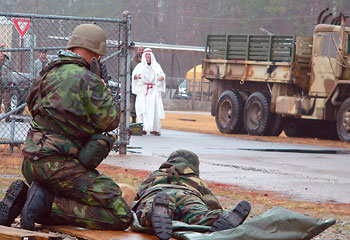Just a drill
By Turner Walston
Published in News on February 23, 2006 1:50 PM
A convoy of about 80 airmen have set up camp at an undisclosed location in Southwest Asia. They are on their way to Iraq from Kuwait, but insurgent rioting has delayed their journey. Their orders are to bed down until the path is clear.
Airmen are on guard. There is a light rain, and the air is cold. Two airmen are enjoying cigarettes. All is quiet.
Then "BANG" an explosion. Shots ring out from the east side. Insurgents are attacking. Airmen scramble for cover and fire back.
After the smoke clears, the airmen stand down.

News-Argus/Turner Walston
Tech Sgt. Ray Pipkins, left, and Senior Airman David Ramey negotiated with Staff Sgt. Jason McQuarrie, portraying an Iraqi chief, during an Expeditionary Combat Skills Training exercise Wednesday.
It was just a drill Wednesday, but the skills the Seymour Johnson Air Force Base airmen practiced could save their lives if they ever face the same situation in combat conditions.
And they just might.
Airmen eligible to be deployed beginning in May are participating in the Expeditionary Combat Skills Training course. The trainees went through a day of classroom training before heading to the field.
"We take them from walk to run," said Master Sgt. Mike Russell, an ECST instructor. "These are the basic tactics they'll need on the battlefield."
Russell said the training is tailored for battles in Southwest Asia.
"They'll be in an environment similar to what they're doing right now."
In one scenario, a local tribe chief attempts to exchange ammunition for food and water for his men. In another, riots break out on the base perimeter. Then, the attack.
Airmen are bedded down in groups of two or three. They communicate via radio.
"On the battlefield, tactics are paramount. You need to be quick, you need to be low. You need to move like you know what you're doing," Russell said.
In addition to battle, the airmen need to know how to interact with local nationals who are acting friendly.
"We're ambassadors when we're over there," Master Sgt. George Stengel said. "When we interact, we need to treat them with some dignity."
Tech Sgt. George Antolick of the 4th Medical Group negotiated an exchange of ammunition for food with a simulated Iraqi national, Chief Mohammed Mohammed, played by Staff Sgt. Jason McQuarrie.
"They approached our position, and through the fabulous training that we're getting, we knew what to say," said Antolick, who has been deployed several times. He was cautious when the chief asked for specific information. "It's a great experience. Very realistic."
During the exercise, Antolick had the chief and his security detail put down their weapons and raise their hands. "Mohammed" was then made to overturn the box of ammunition to show Antolick what was inside.
After the exchange was made, the Iraqis praised the American soldiers. "We love Bush," one said several times.
Antolick said his interactions with "Mohammed" were similar to what an airman would experience while deployed.
"I think that's the best thing they're doing out here," he said. "The realism is amazing. It's good familiarization."
The training culminated in a final assault. Insurgents attacked the American base with simulated gunfire and explosions.
"We throw everything we have at them," Russell said. "It really gets their adrenaline going."
Killed airmen retreat to a tent. Those who run out of ammunition fall back.
Instructors walk among the students in training, shouting instructions. "Put that thing on your shoulder," Russell said to one. "Hold it like a weapon, not a broomstick."
McQuarrie said he enjoys playing the bad guy. He has deployed six times, and is excited to be a part of the training.
"I love the teaching, and I love playing the character." He strives for realism when he plays his role.
"Everything I do is based on experience," he said. "They, a lot of times, ask for candy, food and water."
Injecting a little humor helps the students learn, McQuarrie said.
Today, Chief Mohammed Mohammed asked for Bud Light or Gatorade, but settled for MREs (Meals Ready to Eat).
"Most people learn better when they're enjoying the training."
